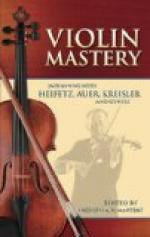“No, no,” he said. “I do not study up any ‘stage business’ to help out my playing! I do not know whether I ought to compare myself to a dancer, but the appeal of the dance is in all musical movement. Certain rhythms and musical combinations affect me subconsciously. I suppose the direct influence of the music on me is such that there is a sort of emotional reflex: I move with the music in an unconscious translation of it into gesture. It is all so individual. The French violinists as a rule play very correctly in public, keeping their eye on finger and bow. And this appeals to me strongly in theory. In practice I seem to get away from it. It is a matter of temperament I presume. I am willing to believe I’m not graceful, but then—I do not know whether I move or do not move! Some of my friends have spoken of it to me at various times, so I suppose I do move, and sway and all the rest; but any movements of the sort must be unconscious, for I myself know nothing of them. And the idea that they are ‘prepared’ as ‘stage effects’ is delightful!” And again Elman laughed.
LIFE AND COLOR IN INTERPRETATION
“For that matter,” he continued, “every real artist has some mannerisms when playing, I imagine. Yet more than mannerisms are needed to impress an American audience. Life and color in interpretation are the true secrets of great art. And beauty of interpretation depends, first of all, on variety of color. Technic is, after all, only secondary. No matter how well played a composition be, its performance must have color, nuance, movement, life! Each emotional mood of the moment must be fully expressed, and if it is its appeal is sure. I remember when I once played for Don Manuel, the young ex-king of Portugal, in London, I had an illustration of the fact. He was just a pathetic boy, very democratic, and personally very likable. He was somewhat neglected at the time, for it is well known and not altogether unnatural, that royalty securely established finds ‘kings in exile’ a bit embarrassing. Don Manuel was a music-lover, and especially fond of Bach. I had had long talks with the young king at various times, and my sympathies had been aroused in his behalf. On the evening of which I speak I played a Chopin Nocturne, and I know that into my playing there went some of my feeling for the pathos of the situation of this young stranger in a strange land, of my own age, eating the bitter bread of exile. When I had finished, the Marchioness of Ripon touched my arm: ’Look at the King!’ she whispered. Don Manuel had been moved to tears.




